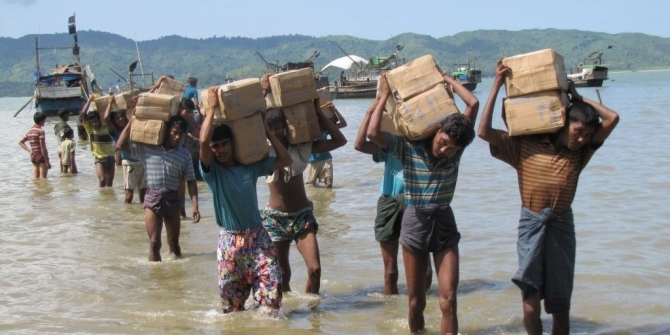Earlier this year the Office of the United Nations High Commissioner for Refugees (UNHCR) announced the removal of international protection for thousands of Chin refugees in India and Malaysia. With the conflict between the Arakan Army and Burmese military in Chin State continuing, Michael Howard and Salai SH Lian from the Chin Human Rights Organization (CHRO) explain why now is not the time to revoke international protection.
 Chin Refugees Protesting in 2015 Credit: CHRO
Chin Refugees Protesting in 2015 Credit: CHRO
In June 2018 approximately 5,000 Chin refugees from Myanmar living in India were informed by the United Nations High Commissioner for Refugees (UNHCR) that they were no longer in need of international protection. By the end of December 2019, the vast majority of Chin refugees will have their refugee status removed and be expected to return to Chin State in Western Myanmar. International protection for Chin refugees is ceasing and voluntary repatriation is now being promoted, aggressively.
In New Delhi approximately 5,000 Chin refugees are registered with the UNHCR. But with 35,000 asylum seekers and 16,200 registered Chin refugees in Malaysia, this is an issue that matters well beyond South Asia. An ongoing conflict between the Arakan Army and Burmese Military in the south of Chin State, both of which regularly bring civilians into their military activities, raise serious concerns about the safety of the return of refugees. In the last few weeks alone, there have been a further two Chin civilians who have died as a result of indiscriminate laying of landmines, and thousands remain internally displaced in an attempt to avoid being caught in the cross-fire of a conflict which has intensified steadily since 2015. Instances of mob-violence and intolerance toward Christian minorities in regions bordering Chin State, who are still not adequately protected under national law, are also of concern.
A fractured and stuttering peace process and an unreformed military beyond civilian control capable of extreme atrocities toward minority populations supports any long-term concerns about the durability of a country of origin change a Chin refugee may have when deciding to return or not.
As of August 2018, Chin refugees who are afforded the protection of the UNHCR face two options: option one is to agree that international protection is no longer necessary. In doing so, an individual would retain their refugee status until the end of 2019; option two is to disagree with this assessment, in which case the Refugee Status Determination Card (RSD) will be temporarily revoked and replaced with a piece of paper that acknowledges an individual in question remains protected until a case review takes its course. This will usually take two months. On failing this case review, the individual forfeits the time-span put forward under the first option and protection ceases immediately. These ‘choices’ are what Chin refugees are presently deciding upon in Malaysia, as individual cessation interviews continue. From the 11th December, 2018, the Chin refugees residing in New Delhi, will be forced to make the same decision.
Voluntary Return
The UNHCR can promote voluntary repatriation within its three core mandates for durable solutions, as long as conditions are premised by durable country of origin situations that guarantee a safe and dignified return. Then, and only then, accurate information which objectively verifies why this assessment is correct can be used to promote voluntary repatriation. According to the notifications circulated by the UNHCR in June 2018, such conditions in other parts of Myanmar are too “fluid and unstable.” But in Chin State, the reality on the ground is very different, where, according to the UNHCR, conditions are “stable and secure from a refugee perspective”. But while this idea of stable and secure is yet to be defined, the refugee agency’s assessment seems to be based mainly on the fact that around 97 per cent of Chin people (as told to us by the UNHCR itself) who have applied for Refugee Status Determination over the past few years have failed.
Such crucial decisions that have far-reaching implications require, at the very least, for an individual to be in possession of as much concrete information as possible. There has been a systematic lack of any adequate consultation with the refugee communities before and after the agency’s notice, nor any information provided on stable and secure rationale, despite official requests. The link between those applying for refugee status failing over the last several years, and the stripping of protection in declaring that conditions for safe and dignified return, at present remains wholly unclear.
This case with Chin refugees could set a dangerous precedent toward what ‘voluntary’ can mean in relation to UNHCR protocol. A critical distinction therefore needs to be made between promotion and coercion. Neither option given to refugees from UNHCR adequately addresses the voluntary aspect of return. As the decision is based on the figures of Chin being granted Refugee Status Determination over the last several years, the second option’s qualifications have an in-built bias, resulting in duress and pressure to admit protection is no longer needed. In their current form, Chin refugees are being coerced to agree that they are no longer in need of international protection, when in large part they do not believe that to be the case and are not being convinced otherwise with any mandated observance on fact-sharing.
Stable and Secure?
With the human rights concerns described above and the ceasefire between the government and the Chin National Front lacking in any monitoring, demobilization, disarmament, reintegration or security sector reform, it is highly debatable that the conditions in the short-term exist for the safe return of the Chin and long term-durability is very difficult to predict. There has been no public statement by the civilian or military government outlining what safe and dignified return would mean. There has been no amnesty or national protection offered. The only signs of cooperation from the government has been behind closed doors and come in the form of “non- objections” largely based on the fact that the Chin people are recognized under the 1982 Citizenship Law.
Even though there is an ongoing drafting of a Memorandum of Understanding (MOU) between Myanmar’s Department of Social Welfare and the UNHCR, to date there has been nothing substantive to come out. And with a refusal to engage in any tripartite implemented return programme, the essential pre-conditions to make the Chin feel safe to return are all currently lacking.
In the Meantime UNHCR Protection is a Necessity
Away from debating terminology, rules, regulations or protocols, the reality for the Chin refugees is a reliance on the UNHCR, a reliance to not only afford them protection from their country of origin but also the authorities of host countries.
Benefits from cards issued after Refugee Status Determination has been granted include the ability to gain employment, for children to attend school, to receive medical attention in local hospitals and, above all, the protection of one’s liberty, on a day to day basis. Since the decision of the UNHCR to cease protection there has been over 10 arrests by the Malaysian authorities, which can be directly attributed to the UNHCR approach to voluntary repatriation promotion, specifically to those who have opted for the second option available to them. Clearly, Option Two, and the piece of paper that duly replaces the Refugee Status Determination card, was not explained to the Malaysian authorities as they arrested Chin people after stop and searches in market-places and on the streets of Kuala Lumpur, despite them having these papers to hand. These are lessons that the UNHCR in India should heed in the coming months.
The present situation leaves those who dispute an undefined country of origin situation more vulnerable to host-country authorities and more vulnerable to those who may look to profit from the unplanned return. It also leaves these refugees with a very uncertain future in their native country. There is a lot that is uncertain relating to UNHCR’s decision, but what seems to be very clear, however, is that this is a long, long way from voluntary return. It is time for a re-think.
This article gives the views of the author, and not the position of the South Asia @ LSE blog, nor of the London School of Economics. Please read our comments policy before posting.
Michael Howard has worked at the Chin Human Rights Organization (CHRO) for 3 years. He has previously held positions researching refugee related issues in India and on the Thai-Myanmar border area. He holds a Masters in International Law.
Salai SH Lian works at the Chin Human Rights Organization (CHRO), based in Hakha, Chin State. As Director for CHRO’s Human Rights and Religious Freedom Programme he teaches Human Rights at the Chin Christian University (CCU) in Hakha. Before joining CHRO, he was a journalist at the Chinland Post and has contributed to the Kachinland News and Chinland Guardian publications.








Nice article. Thanks